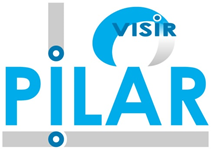

01–03 March, 2023, Porto Palace Hotel, Thessaloniki, Greece (online presentations possible)
The REV is the annual conference of the International Association of Online Engineering (IAOE) together with the Global Online Laboratory Consortium (GOLC).
REV 2023 is the 20th in a series of annual events concerning the area of Online Engineering, Cyber-physical Systems and Internet of Things, including Remote Engineering & Virtual Instrumentation.

Coordinator: UNIVERSIDAD NACIONAL DE EDUCACION A DISTANCIA
Partners: BTH (Sweden), IAOE (Austria), UDeusto (Spain), IPP (Portugal), Omnia (Finland), EVM (Spain), CUAS (Austria)
The Project: PILAR partnership will enhance the learning, teaching and practical training at university and high school levels, by allowing to develop many different electronic practices through a newer and richer level of digital integration. The possibility of real practices at almost real time for many different student profiles will help to develop basic and transversal skills all through the involved countries and, as a second step, all through any interested country. This new VISIR labs federation will also help to address low achievement in basic skills through more effective teaching methods, in a totally new dimension. Only with a federation of existing VISIR nodes will be possible to serve the large student population that may benefit from this technology-enhanced educational tool. This larger impact will also increase the efficiency of public expenditure and the investment in education and training, which could be identified as yet another horizontal or sectoral priority addressed by PILAR. STEM needs of improvement and practical competences that must be addressed in schools, high schools and colleges, as well as might be used in industry for the capacitance and relocation of personal might be obtained through the proposed federation of remote laboratories resources allowing a self-sustainable environment and incrementing the synergies as well as empowering the level of sharing open resources for the whole community.PILAR (Platform Integration of Laboratories based on the Architecture of VISIR) is a project that addresses the following needs:1- Need of real, extensive and intensive, online, cheap practices for building and interacting with electrical and electronics circuits in engineering subjects of university level, and also as a lifelong learning activity (industry oriented) and at a school and high school level.2- Need of reliable, highly available, remote laboratory services offered through Internet by a robust remote labs service provider, which will enhance a stronger digital integration for learning and teaching3- Need of having these practices available at any time and from anywhere, in a timely and controlled manner, helping to increase the number of graduates at the university that cannot easily access these practicesThe main objectives pursued by PILAR are:a. Based in the different implementations of VISIR in several of the partners in the project (BTH, CUAS, UDEUSTO, IPP, UNED), the first objective is building a reliable, highly available, unique international VISIR platform federation, that integrates all the different resources used by VISIR in each of the partners.b. Once established, this federation will be completely opened to other partners in Europe, through easy gateways to the federation, allowing to extend the capabilities of PILAR to much more interested educational institutions.c. Building a set of remote practices, based in this new platform, for electrical and electronics circuits, at school, grade and master level, and also as a lifelong learning activity, that will be offered as remote lab services, to students in all the partners institutions and, as a second step, to anyone interested. The results will bring added value at EU level because the activities cannot be attained in a single country.d. Those new remote lab VISIR Internet services must allow, in a transparent way, the use of the best set of remote learning services of each partner in each moment.Four different aspects can be faced using a federation of the existing VISIR nodes:1. Scalability. The VISIR system is designed to support around 50 users at the same time because the hardware is multiplexed. But if a huge amount of user is expected we need to scale the VISIR using a federation. If the circuits are replicated in different VISIR nodes, more users can access the platform and experiment through the federation. 2. Reliability and availability. Redundancy. If one node is not available for any reason, its effort can be supported by other nodes. That is: if one user is accessing the VISIR in his institution but it is down he will be automatically redirected to another available VISIR node (in other institution). This process will be transparent for the user. In this case, the federation mechanism must know what circuits are available in what VISIR nodes.3. Set of experiments. VISIR is a REAL remote lab, it is like in the classical lab. There you can construct any circuit, but it is not true because in the lab we do not have all the components, we have a set of them (some resistors, some capacitors, some…). In VISIR is the same, we can offer any circuit, but not all of them at the same time. In this situation the federation is very interesting because each VISIR node can implement a set of circuits (DC circuits, AC circuits, Operational Amplifiers circuits, etc.) but the user will not access only to the set of experiments of his institution, but also to the total set of experiments of all the VISIR nodes. 4. Tracking system. The federation must be able to know how many users are accessing each VISIR node, to balance the use of the VISIR federation. The federation software layer must have a system to assure the balance of the nodes and to control the accessing priorities of the different usersAt the end of the project a portfolio of remote VISIR services offered publically will be available, maintained by the partners.The nature of the services will guarantee that students could access the courses from their countries, i.e. it insures virtual mobility without additional financing. Also the services will be easily changeable and upgrade-able allowing the building of new and tuned electrical and electronics real remote practices.IAOE especially with its already existing Special Interest Group (SIG) VISIR will ensure the continuation of the project's results after the period of the project. The VISIR SIG, with more than 45 members, is organized for people who are interested in Online Engineering especially in opening university laboratories for remote access 24/7. VISIR SIG is a group for sharing ideas, equipment and learning material as well as discussing the further development of the VISIR Open Lab Platform. One of its main goals is standardized online workbenches located at universities around the globe constituting grid laboratories available for lab sessions for students on campus and off campus.For that (in analogy to the iLab Alliance) a VISIR Alliance will be founded. Core members of the VISIR Alliance will be some of the consortium members.

The International Association of Online Engineering (IAOE) is an international non-profit organization with the objective of encouraging the wider development, distribution and application of Online Engineering (OE) technologies and it's influence to the society.
The association seeks to foster practices in education and research in universities, higher education institutions and the industry on OE.

The Global Online Laboratory Consortium is focused on promoting the development and sharing of, and research into remotely accessible laboratories for educational use. As the usage of online experiments gains traction in the educational community, there is increasing interest in developing online labs on a common infrastructure. A unified and interoperable architecture is essential to convert the current tremendous interest for online experiments into an economy of labs that can be efficiently shared around the world.
The mission of the VISIR Federation is to upgrade and enlarge the VISIR SIG by integrating both individuals and institutions. The goal is to provide a uniform system where students can register and use the federated VISIR based laboratories and learning materials from different institutions belonging to the federation. Through a shared common mechanism, it should be possible to access each experiment from one single learning management system.
Title: Online Laboratories in Engineering and Technology Education – State of the Art and Trends for the Future.
Please find the call here.
You are invited to submit a proposal for the 2024 International Online Laboratory Awards, presented by the Global Online Laboratory Consortium (GOLC).
Please find the call here.
Congratulations to the winners of the 2023 International Online Laboratory Awards, presented by the Global Online Laboratory Consortium (GOLC).
Please find them here.
You are invited to submit a proposal for the 2023 International Online Laboratory Awards, presented by the Global Online Laboratory Consortium (GOLC).
Please find the call here.
The International Journal of Online and Biomedical Engineering (iJOE) will publish a Special Issue on Online-Labs in Education.
Please find the call here.
Congratulations to the winners of the 2022 International Online Laboratory Awards, presented by the Global Online Laboratory Consortium (GOLC).
Please find them here.
You are invited to submit a proposal for the 2022 International Online Laboratory Awards, presented by the Global Online Laboratory Consortium (GOLC).
Please find the call here.
Congratulations to the winners of the 2021 International Online Laboratory Awards, presented by the Global Online Laboratory Consortium (GOLC).
Please find them here.

IAOE's International Journal of Recent Contributions from Engineering, Science & IT
More information in this PDF.

IAOE endorses Age-friendly Cities Conference and Exhibition 2021 (AFC2021) (Fully Virtual). Please find more information here.
You are invited to submit a proposal for the 2021 International Online Laboratory Awards, presented by the Global Online Laboratory Consortium (GOLC).
Please find the call here.
Congratulations to the winners of the 2020 International Online Laboratory Awards, presented by the Global Online Laboratory Consortium (GOLC).
Please find them here.
You are invited to submit a proposal for the 2020 International Online Laboratory Awards, presented by the Global Online Laboratory Consortium (GOLC).
Please find the call here.
Congratulations to the GOLC OLA 2019 Winners! They can be found here.
You are invited to submit a proposal for the 2019 International Online Laboratory Awards, presented by the Global Online Laboratory Consortium (GOLC).
Please find the call here.
You are invited to attend the 'Online Laboratories in Engineering Education' workshop during ASEE Annual Conference on 24 June 2018 in Salt Lake City.
Please find the details here.
You are invited to submit a proposal for the 2018 International Online Laboratory Awards, presented by the Global Online Laboratory Consortium (GOLC).
Please find the call here.
The Astana EXPO-2017 and the "World Scientific and Engineering Congress 2017" will take place on June 19-20 2017.
Further information visit Astana EXPO-2017 and WSEC 2017.
The MOOC for Enhancing Laboratory Learning Outcomes (MELLO) is scheduled to begin on Monday 16 January 2017 and run for 6 weeks.
Further information here or go directly to the MELLO website.
You are invited to submit a proposal for the 2017 International Online Laboratory Awards, presented by the Global Online Laboratory Consortium (GOLC).
Please find the call here.
You are invited to submit a proposal for the 2016 International Online Laboratory Awards, presented by the Global Online Laboratory Consortium (GOLC).
Please find the call here.